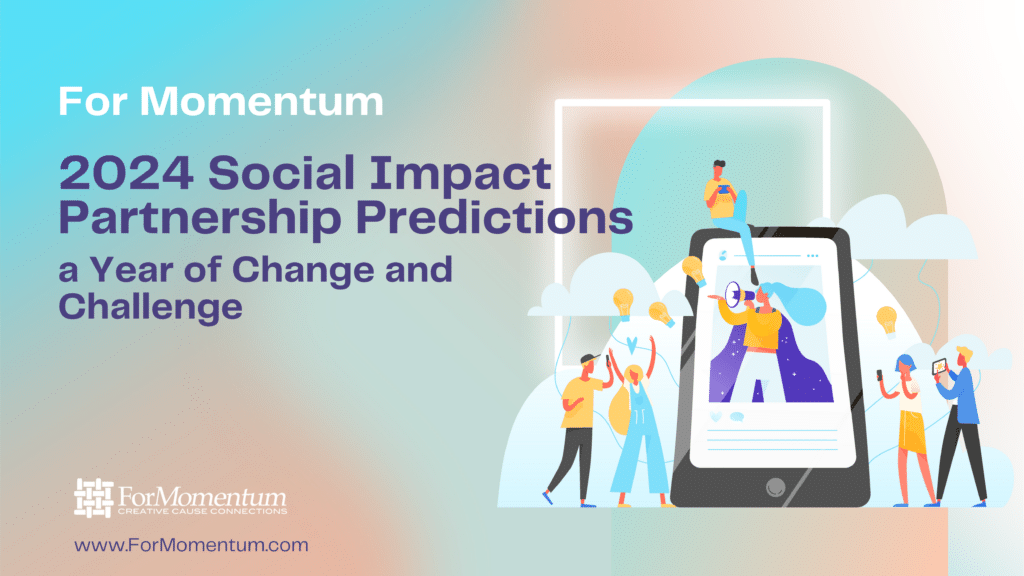By: Mollye Rhea
2024 is shaping up to be a pivotal year for social impact. With an election year on the horizon, mounting pressure on corporate social stances and a focus on local communities, several key cause partnership trends are unfolding.
Election Year Amplifies Big Issues
The 2024 election is likely to be one of the most consequential in recent history. According to Gallup, voters are increasingly concerned about big issues such as the cost of living, women’s rights and wars abroad. We can expect the politicization of these issues to prompt companies to proceed with more caution in the causes they support.
In addition, pressure from employees and consumers will encourage more companies to support “get out the vote” efforts across the country. Last year, many workers, from autoworkers to actors, galvanized to strike and protest everything from pay to working conditions.
This year is likely to be a year of increased activism and protest in that same vein as the election puts these issues front and center. Companies will balance this by encouraging workers to vote through company-wide holidays on Election Tuesday and partnering with nonpartisan organizations helping more people access voting across the country.
Companies Rethink Their Approach to Social Issues
In an era of misinformation, trust is more important than ever. As both consumers and employees see businesses as one of the only institutions as competent and ethical, we will continue to see higher standards placed on their CSR efforts. In 2024, we can expect to see companies and organizations place a greater emphasis on building trust with their stakeholders. This will involve being transparent about their operations and social impact efforts.
In 2023, several companies, from Budweiser to Target, came under fire for their stances on divisive social issues. Due to this public backlash, as well as increased negative press on a variety of DEI and ESG initiatives, we can expect companies to backpedal strident public support of nonprofit partners that may carry business risk.
In fact, by the end of last year, we were already seeing this backlash come to fruition. In a December 2023 survey by ACCP, their CSR members reported that nearly 70% of CSR & ESG professionals are worried about the long-term impact of corporate commitments to DEI following the Supreme Court’s Affirmative Action ruling and that they were already changing the way they communicate about their DEI efforts. At the same time, only 9% reported a decrease in commitments to DEI so far. Decreases are likely to continue, though, leading to a shift from a public focus on racial, gender and equity causes toward a stronger focus on these commitments internally.
Companies will likely go back to the drawing board and closely scrutinize the causes they choose to focus on in their CSR priorities. The challenge is that almost 70% of employees expect societal impact through their jobs. 2024 will be the year of balancing public scrutiny vs. internal workers’ criticisms of their companies’ priorities. Partnership focus is likely to swing back toward causes that are closely aligned to their longstanding values like innovation, leadership, operational excellence, quality and affordability.
A Focus on Local Impact
In a world that is increasingly divided both socially and politically, we can expect to see a renewed focus on local communities in 2024. Companies and nonprofits of all types and sizes will be looking for ways to make a positive impact in the communities where they operate. This could include:
- Supporting local and diverse small businesses
- Investing in local infrastructure
- Partnering with local nonprofit organizations to address community needs
In a webinar For Momentum hosted last year, Achieving Alignment: Harnessing Data To Set Cause Partnership Expectations, Emily Crawford, Director of Impact at Inspire Brands Foundation, shared an important story around one of their brand’s shift from partnering with only national nonprofits to also include local nonprofits.
While the company and brands still support national-level partnerships, it made more practical sense for some of their franchise restaurants to switch their support to local nonprofits. Partnership benefits can seem less political and more tangible when you see them in your community.
As Emily explained, “Local partnerships help to engage our local operators and allow them to be the hero in their community by giving them resources to support causes that matter to them, their team and their guests.”
In addition, a growing interest from younger consumers on environmental sustainability is also driving the push toward local impact. This is due to the increasing awareness of the climate crisis and the impact that it’s having on the planet. Companies and brands will be looking for ways to reduce their environmental footprint by focusing on local partnerships within the communities they operate.
______________________________________
These are just a few of the social impact predictions for 2024. It is sure to be a year of change and challenge, but it is also an opportunity for businesses and nonprofits to band together to make a real difference in the world. By being aware of the trends that are shaping the social impact landscape, we can better prepare for the challenges and find the opportunities that lie ahead.
Need help navigating? We’re here to brainstorm. Reach out to get the conversation started.


Well written and informative, Mollye!